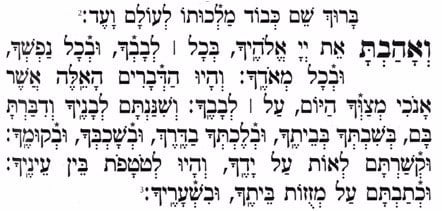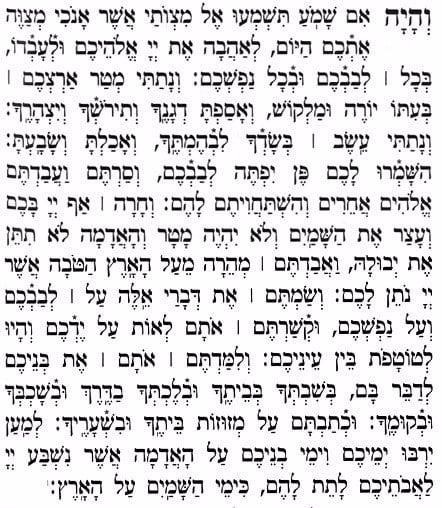Engraving this counterintuitive idea into our psyches is our greatest challenge, but key to developing a true appreciation for, and a relationship with, our Creator. Towards this end, every morning and night we recite the “Shema”, or “Shemah”, consisting of three biblical paragraphs (Deuteronomy 6:4–9; 11:13–21; Numbers 15:37–41). These paragraphs contain Judaism’s defining statement: Hear O Israel, the L‑rd is our G‑d, the L‑rd is One. Shema then discusses some of Judaism’s basics: love of G‑d, Torah study, the principle of divine reward and punishment, and our exodus from Egypt.
Contemplating these words enables us to see beyond the mirage—and live accordingly.
Shema is part of the morning and evening prayers. Say the Shema, though, even if you won’t be reciting the prayers.
When:
“When you lie down and when you rise up”—Deuteronomy 6:7.
Morning: During the first quarter of the day—starting from when there is sufficient light to recognize a casual acquaintance from a short distance.
Night: From when the stars appear until dawn. Preferably, however, before midnight.
How:
If you don’t understand Hebrew, say the Shema in your language.
Ascertain that your environment is clean and modest, and make sure to carefully articulate and enunciate each word. No interruptions for the duration of the prayer.
Cover your eyes with your right hand while you say the first verse—blocking out distracting external stimuli. Recite the verse aloud, for the same reason.
Ideally, men should wear tallit and tefillin—mitzvahs discussed in the Shema—for the morning Shema.
Recite the following verse in a softer undertone:



Source: Chabad.Org
The phrase “Shemah Yisrael” can be translated as “Hear, O Israel,” and it is a call to attention, an urging to listen and to internalize the message of the prayer. The full text of the Shemah is as follows:
“Shemah Yisrael Adonai Eloheinu Adonai Echad.”
This translates to “Hear, O Israel: The Lord is our God, the Lord is One.”
The Shemah is a declaration of faith in the oneness of God, and it is recited twice daily, in the morning and in the evening. It is also recited as part of the bedtime prayers.
In addition to being a declaration of faith, the Shemah also serves as a reminder of the central beliefs of Judaism, including the importance of loving God with all of one’s heart, soul, and might, and of passing on these beliefs and traditions to future generations.
Overall, the Shemah Yisrael is a fundamental prayer in Jewish tradition that serves as a reminder of the belief in the oneness of God and the importance of passing on this faith to future generations. Also, the Shemah Yisrael is an essential part of Jewish worship and is considered one of the most significant prayers in Judaism. The recitation of the Shemah is a way to connect with God, and it is often said with great reverence and devotion.
The phrase “Adonai Eloheinu Adonai Echad” is particularly significant in Jewish tradition, as it affirms the belief in the unity of God. This belief is one of the core tenets of Judaism, and it is expressed in the Shemah Yisrael with extreme emphasis.
The Shemah is also associated with the practice of wearing tefillin, which are small leather boxes containing scriptural passages. Tefillin are worn during morning prayers and include the words of the Shemah.
In addition to being recited in daily prayer, the Shemah is also traditionally recited at the Jewish deathbed, as it is seen as a powerful affirmation of faith in the face of mortality. Overall, the Shemah Yisrael is a deeply significant prayer in Jewish tradition that expresses the belief in God and serves as a reminder of the central beliefs and practices of Judaism.
Shemah (or Shema) FAQ:
What is the meaning of the phrase “Shemah Yisrael”?
The phrase means “Hear, O Israel” and is the opening words of a prayer in Jewish tradition.
What is the full text of the Shemah prayer?
The full text is “Shemah Yisrael Adonai Eloheinu Adonai Echad,” which means “Hear, O Israel: The Lord is our God, the Lord is One.”
What is the significance of the Shemah Yisrael in Jewish tradition?
The Shemah is considered one of the most important prayers in Judaism and is recited twice daily as a declaration of faith in the oneness of God.
What does the Shemah Yisrael affirm about God?
The prayer affirms the belief in the singularity of God, the core tenet of Judaism.
Why is the phrase “Adonai Eloheinu Adonai Echad” significant?
It emphasizes the belief in the oneness of God and serves as a reminder of the central beliefs of Judaism.
When is the Shemah Yisrael recited?
It is recited twice daily, in the morning and in the evening, and also as part of the bedtime prayers.
What is the connection between the Shemah Yisrael and tefillin?
The Shemah is recited as part of the tefillin ritual, where small leather boxes containing scriptural passages are worn during morning prayers.
What is the significance of the Shemah Yisrael in a Jewish deathbed recital?
The prayer is recited as a powerful affirmation of faith in the face of mortality.
What does the Shemah Yisrael teach about the importance of passing on Jewish beliefs and traditions?
It emphasizes the importance of loving God with all of one’s heart, soul, and might and passing on these beliefs and traditions to future generations.
What is the purpose of the Shemah Yisrael prayer?
Its purpose is to connect with God and to express the belief in the oneness of God.
What is the origin of the Shemah Yisrael prayer?
It comes from Deuteronomy 6:4-9, which is a passage in the Old Testament.
How is the Shemah prayer traditionally recited?
It is recited while standing, with your eyes closed or covered, and with great reverence and devotion.